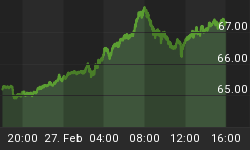The U.S. Dollar posted strong gains against all major currencies as concerns about Greece's ability to stick to its new strict budget flared up once again. In addition, a fresh wave of selling pressure hit the Euro after Moody's Investor Service downgraded ratings on about 4 billion Euros of Greek bank hybrid securities. Both events encouraged investors to seek safety in the U.S. Dollar.
Besides rallying from demand from risk adverse traders, the Dollar also soared after the release of better than expected U.S. economic data. Housing starts, import prices and industrial production were all reported better than pre-report estimates.
The Dollar was able to maintain its gains throughout the session and even received a late session boost when the FOMC minutes showed that the Fed was strongly discussing hiking the discount rate and implementing an exit strategy. This helped add additional upside pressure to the Dollar because it meant that the Fed thought the recovery was far enough along to begin raising interest rates while withdrawing additional liquidity from the financial system.
Wednesday's loss in the Euro erased all of Tuesday's gains. Recent talk of a possible resolution to the Greek deficit situation has failed to attract sustained buying. Investors are still looking for more concrete guidelines before committing heavily to the long side. In addition, it has been widely reported that a record amount of short positions are working against the Euro. The weak close and increased downside momentum has the EUR USD in a position to challenge last week's bottom at 1.3531.
A rise in U.K. jobless claims and dovish comments from the Bank of England minutes helped fuel early weakness in the GBP USD. Additional selling pressure hit the British Pound following the release of stronger than expected U.S. economic data.
This morning the BoE said that the economy is "recovering, but only weakly". In addition, it said the country faces "considerable" resistance as it expects credit to remain tight "for some time". The information garnered from the BoE minutes suggests the central bank will remain dovish on the economy for a prolonged period of time.
In addition to the weak economy, the U.K. still faces a growing budget deficit and the possibility of a downgrade of its credit rating.
The falling Euro kept the pressure on the Swiss National Bank to once again intervene to weaken its currency. This triggered a strong rally in the USD CHF. The strong economic news fueled the rally in the USD JPY.
Stronger demand for the U.S. Dollar helped weaken the commodity-linked Australian Dollar, New Zealand Dollar and Canadian Dollar. Gold and Crude Oil finished mixed but traders for the most part shied away from the long-side of the commodity markets. Technically, the AUD USD and NZD USD posted closing price reversal tops. This could trigger the start of a 2 to 3 day break or a 50% correction of the recent rally. The charts indicate a break to .8806 in the Aussie is likely over the near-term. The short-term downside target for the Kiwi is .6942.















